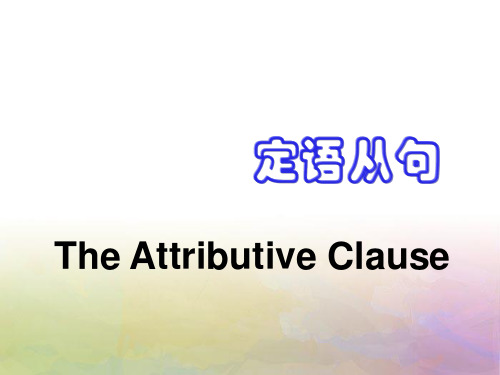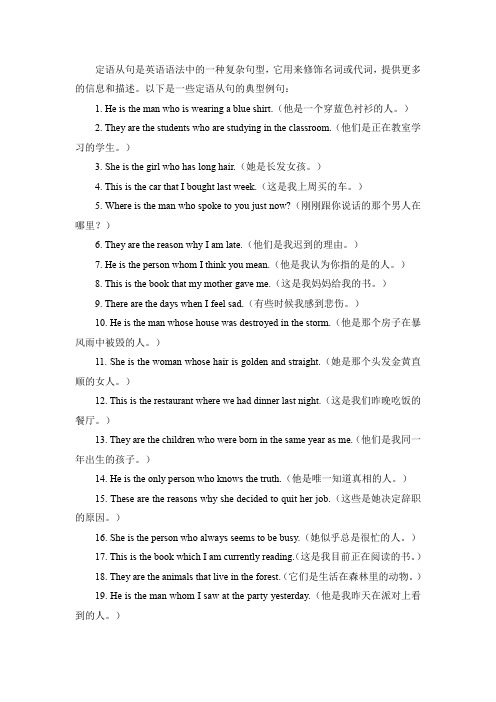1定语从句
1.定语从句(形容词性从句)专题讲解

定语从句(Attributive Clause)一关系代词引导的定语从句(who/whom/whose/which/that)1.Who,指代范围是人,句子中充当主语/宾语(限定性定语从句中作宾语可省略)①作主语The boy who is standing there is my cousin.②作宾语The young man(who)Jane loves is standing there.2.Whom,指代范围是人,句子中只充当宾语(限定性定语从句中作宾语可省略)The man(whom) you met yesterday is my teacher.注意:紧接着介词后面作介词的宾语时只能用whom,不用who;如果介词在词尾两者都可以。
①This is the person from whom I learn about news.②This is the person who/whom I learn about news from.不过按照习惯,一般介词都会放在前面,①中那样比较常见。
3.Whose(of whom/of which),指代范围人/物,句子中充当定语①Do you know the boy whose father(the father of whom) is an teacher?②He lives in a house whose windows (the window of which) face south.注意:“介词+关系代词”从句中作定语时被修饰词常常需要提前。
There is a room, the window of which faces the river.4.Which 代指物,句子中充当主语/宾语(限定性定语从句中作宾语可省略)①Children like to read books which have wonderful pictures.②The pen(which) my uncle gave me is missing.注意:which除了指物以外,还可以指代婴儿、动物和表示表示单数意义的集合名词,此外还可以指人的职业、地位或品格等。
定语从句1--关系代词

4.句中有who,
which Which is the bike that you lost? 5. 先行词为物与人 They talked about the schools and teachers that they had visited. 6. 关系代词在定语从句中作表语, (定语从句为 there be句型) He is all (that) a man should be. Our school is no longer the school that it used to be. He asked for the latest book (that) there is on the subject.
2.介词前置
He is the students for whom the teachers are looking.
We
depend on the land that/which we get our food from. We depend on the land from which we get our food. Kate, in whose car I went to Beijing, is very kind.
3.WHO
1. 在非限制性定语从句中 Charles Smith, who was my former teacher, retired last year. The children, who wanted to play football, were disappointed when it rained. 2. 先行词是指人的不定代词如one, ones, anyone,和those 时 One who has nothing to fear dares to tell the truth. 3.主句为there/here be开头 Here is a boy who wants to see you. 4. 先行词与定语从句被其他词所分隔 Don’t tell anyone about the secret who oughtn’t to know. I was the only person in my office who was invited.
定语从句 1 高中英语定语从句 与非限制性定语从句 relative clause

做主语不可省略 做宾语可省略
whose
Whose book is this ? It is Mary’s book.
Mary is a good uploader. Her videos are of great use.
non-defining
extra information
My uncle is a dentist, who plays tennis every week.
先行词是否明确
不明确----需要定语从句(defining relative clause)限制修
饰,让所指更具体
He is a person. Hi is a person who is really warm-hearted. 明确------可以用非限制从(non-defining relative clause)
she= who
3.合并句子,注意关系代词通常紧跟在名词之后,表示两者的修饰 关系。
I met a woman who can speak six languages.
I met a woman who can speak six languages.
先行词
关系词
从句使用陈述语序
关系代词: who,that.which whose,whom
wanted met
object 宾语
a bag some money some books some people
定语/关系从句就是...
本质上具有形容词修饰作用的句子,用来修饰 名词/代词/句子 I know a writer who is from Japan.
定语从句(一)

定语从句(一)定语从句及相关术语1.定语从句:定语从句是由关系代词或关系副词引导的从句,其作用是作定语修饰主句的某个名词性成分,相当于形容词,所以又称为形容词性从句,一般紧跟在它所修饰的先行词后面。
2.关系词:引导定语从句的关联词称为关系词,关系词有关系代词和关系副词。
关系代词有that, which, who, whom, whose, as等;关系副词有where, when, why等。
关系词常有3个作用:1,引导定语从句。
2,代替先行词。
3,在定语从句中担当一个成分。
注:关系代词有主语.宾语之分。
一般whom作为宾语。
4.定语:定语用来限定、修饰名词或代词的,是对名词或代词起修饰、限定作用的词、短语或句子,汉语中常用‘……的’表示。
主要由形容词担任。
此外,名词,代词,数词,分词,副词,不定式以及介词短语也可以来担任,也可以由一个句子来担任.单词作定语时通常放在它所修饰的词之前,作前置定语。
短语和从句作定语时则放在所修饰的词之后,作后置定语。
限定性定语从句I.关系代词1. that既可代表事物也可代表人,which代表事物;它们在从句中作主语或宾语,that在从句中作宾语时常可省略关系词,which在从句中作宾语也可以省略。
而且,如果which在从句中作“不及物动词+介词”的介词的宾语,注意介词不要丢掉,而且介词总是放在关系代词which的前边,但有的则放在它原来的位置2. which作宾语时,根据先行词与定语从句之间的语义关系,先行词与which 之间的介词不能丢3. 代表物时多用which,但在带有下列词的句子中用that而不用which,这些词包括当先行词是anything, everything, nothing , none等不定代词时,或者是由every, any, all, some, no, little, few, much等修饰时等,这时的that常被省略还有先行词前有序数词或形容词最高级修饰时,或先行词就是序数词或最高级时.以及先行词中既有人又有物时.还有句中前面有which时,都只能用that4. who和whom引导的从句用来修饰人,分别作从句中的主语和宾语,whom 作宾语时,要注意它可以作动词的宾语也可以作介词的宾语5. whose是关系代词,修饰名词作定语,相当于所修饰成分的前置所有格.它引导的从句可以修饰人和物, 当它引导的从句修饰物体时, 可以与of which 调换,表达的意思一样。
定语从句1

Exercise:
1. This is all ____ I know about the matter. A. that B. what C. who D. whether 2. Is there anything else _____ you require? A. which B. that C. who D. what 先行词为everything,little, much , all , anything , 3. The last place _____ we visited was the Great nothing, none, few 等词时, Wall. A. which B. that
The house in _______ which he used to live has turned into a library.
5.关系代词前有介词时 (介词提前) .指 人只用whom, 指物只用which This is the boy with whom he talked. This is the ring on which she spent 1000 dollars.
一、概念: 在复合句中修饰名词或代词的句子. (在句子中作定语)
Harry Porter is a smart boy.
形容词作定语
Harry Porter is a boy who has magic power.
句子作定语,修饰boy, 叫做定语从句
Harry Porter is a boy who has magic power.
I know the girl. 分解 The girl’s mother is a teacher.
作定语
2. which, that 的用法
定语从句典型例句100句

定语从句是英语语法中的一种复杂句型,它用来修饰名词或代词,提供更多的信息和描述。
以下是一些定语从句的典型例句:1. He is the man who is wearing a blue shirt.(他是一个穿蓝色衬衫的人。
)2. They are the students who are studying in the classroom.(他们是正在教室学习的学生。
)3. She is the girl who has long hair.(她是长发女孩。
)4. This is the car that I bought last week.(这是我上周买的车。
)5. Where is the man who spoke to you just now?(刚刚跟你说话的那个男人在哪里?)6. They are the reason why I am late.(他们是我迟到的理由。
)7. He is the person whom I think you mean.(他是我认为你指的是的人。
)8. This is the book that my mother gave me.(这是我妈妈给我的书。
)9. There are the days when I feel sad.(有些时候我感到悲伤。
)10. He is the man whose house was destroyed in the storm.(他是那个房子在暴风雨中被毁的人。
)11. She is the woman whose hair is golden and straight.(她是那个头发金黄直顺的女人。
)12. This is the restaurant where we had dinner last night.(这是我们昨晚吃饭的餐厅。
)13. They are the children who were born in the same year as me.(他们是我同一年出生的孩子。
定语从句句型
定语从句句型定语从句句型导语:定语从句不同于单词作定语的情况,它通常只能放在被修饰的词(即先行词)之后。
以下店铺为大家介绍定语从句句型文章,欢迎大家阅读参考!定语从句句型定语从句: 在复合句中修饰名词或代词的句子在复合句中充当定语,所以叫作定语从句.先行词:定语从句所修饰的名词或代词.关系词:引导定语从句的词,分为关系代词(who,whom,that,which,whose)和关系副词(where,when,why,).复合句: The man who (that) came is Mike.先行词关系代词Li Ming is the one that got full marks in our class.先行词关系代词上句的黑体字为复合句中的主句,蓝体字为定语从句.一定语从句的关系代词 Which的用法: 若先行词指物则代替先行词在定语从句中充当主语或宾语.This is the pen which was given by my friend.先行词指物代替先行词在定语从句中充当主语This is the pen which my friend gave to me.先行词指物代替先行词在定语从句中充当宾语二定语从句的关系代词 Who的用法: 若先行词指人则代替先行词在定语从句中充当主语或宾语(如果前面带介词则必须用whom) The man who is wearing a white suit is my brother.先行词指人代替先行词在定语从句中充当主语The man whowhom he wanted to see last week is in Shanghai.先行词指人代替先行词在定语从句中充当宾语She is the girl with whom I went there.先行词指人代替先行词在定语从句中充当介宾且介词于前.三定语从句的关系代词 Whom的用法: 若先行词指人则代替先行词在定语从句中充当宾语(包括介词的宾语) ,与who的`区别是如果前面带介词则必须用whomThis is the teacher whomwho we like best.先行词指人代替先行词在定语从句中充当宾语She is the girl whom who I went with there.先行词指人代替先行词在定语从句中充当介宾.I don’t like the boy to whom you are talking.先行词指人代替先行词在定语从句中充当介宾且介词于前.四定语从句的关系代词that的用法: 若先行词指人或物则代替先行词在定语从句中充当主语或宾语The animal that which is lost is a panda.先行词指物代替先行词在定语从句中充当主语She is the person that who we are worried about.先行词指人代替先行词在定语从句中充当宾语注意1 that which在代物时常常可以通用,但有时只宜于用which ,不用that(1) 关系代词前有介词时.This is the hotel in which you will stay.(2) 如有两个定语从句,其中一句的关系代词是that,另一句宜于用which.Let me show you the novel that I borrowed from the liberary which was newly open (新开放) to us.注意2that which在代物时常常可以通用,但有时只宜于用that ,不用which.(1) 先行词是形容词最高级或者它的前面有形容词最高级时This is the best that has been used against air pollution(反对空气污染) in cities.English is the most difficult subject that you will learn during these years.(2) 先行词是序数词,或它的前面有一个序数词时He is the last person that I want to see.(3) 主句中已有疑问词时Which is the bike that you lost?(4) 先行词既有人又有物时The bike and its rider that had run over (撞倒了)an old man were taken to the police station.(5) 先行词是all,much,little,something,everything,anything,nothing,none,the one等代词时You should hand in all that you have.We haven’t got much that we can offer you.I mean the one that you talked about just now.(6) 先行词前面有only,any,few,little,no,all,one of,the same,the very等词修饰时The only thing that we can do is to give you some money.Li Ming is the only one that got full marks (满分)in our class.Li Ming is one of the students that want to be teachers in our class.(7) 有两个定语从句,其中一个关系代词已用which,另外一个宜用thatEdison built up a factory(办了一个工厂) which produced things that had never been seen before.定语从句的关系副词 Where的用法:若先行词指地点且其在定语从句中充当地点状语.This is the house+I was born in the house. (=I was born there) 介词短语副词=This is the house where I was born.这就是我在那儿出生的房子.先行词关系副词in which I was born.介词+关系代词which I was born in.关系代词这里作介宾的which和that可以省略that I was born in关系代词.练习:用which ,where填空1 This is the factory where they want to visit.2 My sister works in a bookshop in which we can read many kinds of books3 Have you visited the city where the famous scientist was born?4 Is this the museum which they visited last month?5 He built a telescope through which he could study the skies.6 The pencil with _which_______ he wrote was broken.7 Is this the shop _which____ sells children’s clothing?8 I still remember the sitting-room _where____ my mother and I used to sit in the evening.9 Don’t go in, this is the shop _which____ we have just been to.10 Please show me the book _which____ you bought yesterday _____.二定语从句的关系副词When的用法: 若先行词指时间且其在定语从句中充当时间状语.He came at a time +we needed help at a time.介词短语=He came at a time when we needed help关系副词at which we needed help介词+关系代词which we needed help at关系代词这里的作介宾的which 和that可以省略that we needed help at三关系副词why的用法:在定语从句中只要先行词是the reason,它的关系副词就是why.如:The reason why I’m calling you is to invite you to the party.【定语从句句型】。
1定语从句
Module 1 Lesson 1定语从句The attributive clause【课前小测验】一、把下列每对句子合并成含有定语从句的主从复合句:1. The magazine is mine. He has taken it away.2. The train was late. It was going to Nanning.3. The students will not pass the exam. They don’t study hard.4. Here is the girl. Her brother works in this shop.5. That’s the child. We were looking at his drawing just now.6. She is such a kind-hearted girl. Everybody wants to make friends with her.7. This is the old farmhouse. The windows of the house are all broken.8. He has three sons. Each of them has a handsome salary.9. He used to live in a big house. In front of it grew many banana trees.10. It has been known to all of us. No pains, no gains.二、根据句子意思,在第一个空白处填入介词,在第二个填入关系代词whom或which:1. The person ________ ________ I spoke just now is the manager that I told you about.2. The pencil ________ ________ he was writing broke.3. Wu Dong, ________ ________ I went to the concert, enjoyed it very much.4. The two things ________ ________ Marx was not sure were the grammar and some of the idioms of English.5. Her bag, ________ ________ she put all her books, has not been found.6. The stories about the Long March, ________ ________ this is one example, are well written.三、单选题1. The man ____ visited our school yesterday is from London.A. whoB. whichC. whomD. when2. The woman ____ is talking to my mother is a friend of hers.A. whoseB. whoC. whomD. which3. Because of my poor memory, all ____ you told me has been forgotten.A. thatB. whichC. whatD. as4. Do you remember those days ____ we spent along the seashore very happily?A. whenB. whereC. whichD. who5. Tom did not take away the camera because it was just the same camera ____ he lost last week.A. whichB. thatC. whomD. as6. Those ____ want to go please sign their names here.A. whomB. whichC. whoD. when7. Where is the man ____ I met this morning?A. whenB. whereC. whichD. who8. Who is the woman ____ is sweeping the floor over there?A. whoB. /C. thatD. when9. The man ____ you talked just now is a worker.A. whoB. whomC. to whomD. to who10. The man ____ you are going to make friends is my father’s neighbor.A. with whomB. whenC. to whomD. which(一)定义及相关术语Eg. a blonde girl ,a girl with blonde hair或a girl who has blonde hairTom is the only person who can keep a cool head in time of crisis.China is no longer the weak nation that she used to be.I like to go to the gym where I can have a work-out after sitting for a day.1.定语从句:修饰某一名词或代词的从句叫定语从句。
定语从句讲解(一)
情况:先行词和关系词分开。
Because of the financial crisis(经济危机), days are gone ( )local 5-star hotels charged 6,000 yuan for one night. A. if B. when C. which D. since 2. I have reached a point in my life ( ) I am supposed to make decisions of my own. A. which B. where C. how D. why
3.After graduation she reached a point in her career____she needed to decide what to do. A.that B.what C.which D.Where 4. —What do you think of teaching, Bob? —I find it fun and challenging. It is a job ______ you are doing something serious but interesting. A. where B. which B. C. when D. that
关系代词作主语
The trees have lost their leaves. They are behind the office building. The trees which are behind the office building have lost their lives.
The woman got the job. The woman can speak Russian. The woman who can speak Russian got the job. The teacher will give us a talk. The teacher is famous. The teacher who is famous will give us a talk.
定语从句(1)关系代词
____ you can hire to reach your host family.
A. which 答案:A.
B. where
C. when
D. that
Is she the girl who wants to see
you?
The girl wants to see you.
关系词
词形
所修饰先行词
充当成分
She has a gift for creating an atmosphere for
her students ____ allows them to communicate freely with each other.
词进行考察 在空格前有介词的情况下,先行词指人用 whom,指物用which,排除who和that的干扰
对关系词前的介词的选择进行考察
先行词定位 地位: 承上启下,中心环节 词性: 名词/代词 也可能是整句
常见位置:
紧挨着空格,主句句末
关键
从句意上去判断
要点
在从句中关ich
B. where C. what
D. who
答案:A. which.
定语从句关系代词选择步骤
1.先行词定考点 2.句式排除干扰项 3.空格看成分 4.判断人物事
You’ll find taxis waiting at the bus station,
的限定作用强于非限制性定语从 句。
His girlfriend,who is rich,
dumped him yesterday.
His girlfriend who is rich
dumped him yesterday.
- 1、下载文档前请自行甄别文档内容的完整性,平台不提供额外的编辑、内容补充、找答案等附加服务。
- 2、"仅部分预览"的文档,不可在线预览部分如存在完整性等问题,可反馈申请退款(可完整预览的文档不适用该条件!)。
- 3、如文档侵犯您的权益,请联系客服反馈,我们会尽快为您处理(人工客服工作时间:9:00-18:30)。
英语句子及句子成分 (一) 句子的定义: 句子是用来描述一件事情,表达一个思想, 提出一个问题,它是有一定的语法结构排列组成的。如 The football is in the box. (二) 句子的分类: 句子可以从两种角度来分类: 1) 根据句子的用途来分,英语的句子有下列几种: 1. 陈述句: 用来陈述,讲明一件事情,一个情况。 I like music. Mr. Green came to our university to teach English. 2.疑问句: 向对方(听众)提出问题的句子就叫疑问句,一般需对方作出回答。 What do you want?- I want a book. How old are you? -I'm ten years old. 3.祈使句: 用来向对方(听众)发出请求,命令的句子叫祈使句。祈使句一般需对方作出行为动作。 Come here, please. Come to my office immediately. 4.感叹句: 用来表示自己的一种强烈感情的句子叫感叹句。 What an interesting story it is! How beautiful your sweater is! 2) 根据句子的结构来分,句子可分为下列几种: 1. 简单句 句中只含有一个主语或并列主语和一个谓语或并列谓语的句子叫做简单句。 I study English every day. 2. 并列句 由连接词或两个以上(含两个)的简单句连在一起的句子叫做并列句。在并列句中,各个简单句意思完整,不受其他简单句的影响。 These flowers are white and those flowers are red。I am a worker but my brother is a professor. 3. 复合句 句子中含有从句的句子叫做复合句。 I know it's difficult to master English well. Can you tell me how many students there are in your class?
英语的基本句型主要有五种 1、主语———系动词———表语 2、主语———动词 3、主语———动词———宾语 4、主语———动词———宾语———宾语 5、主语———动词———宾语———补语 一、主语---系动词----表语 1. Mr. Brown is an engineer. 2. Gradually he became silent. 3. The question remained unsolved. 二、主语———动词 在这一句型中,动词为不及物动词及不及物的动词词组。在有的句子中,不及物动词可以有状语修饰。 1.The sun is rising. 2.Did you sleep well?(well做状语,修饰不及物动词sleep) 3.The engine broke down. 三、主语———动词———宾语 在此句型中,动词为及物动词。 1.Do you know these people? 四、主语———动词———宾语———宾语 在此句型中,动词可以称作双宾语动词,这样的动词并不多,在学习遇时,要牢记。 1. He handed me a letter. 2.She gave me her telephone number. 3.Can you inform me where Miss Green lives? 五、主语———动词———宾语———宾语补足语 1.He found his new job boring.、 2.They called their daughter Mary.
一. 句子的成分:句子的成分是指组成句子的各个部分,即:主语、谓语、表语、 宾语(直接宾语和间接宾语)、补足语、定语、状语等。 主要成分:主语 和 谓语 次要成分:表语、宾语、补足语、定语、状语 等 (一) 主语Subject:一般位于句首,一般由名词、代词、数词、不定式、动名词、名词化的形容词和主语从句等充当。 Tom is a good boy. We often speak English in class. One-third of the students in this class are girls. To swim in the river is a great pleasure. Smoking does harm to the health. The rich should help the poor. When we are going to have an English test has not been decided. It is necessary to master a foreign language. (二)谓语Predicate:说明主语所做的动作或具有的特征和状态。说明主语“做什么”、 “是什么”或“怎么样”,一般由动词或动词短语来充当,一般放在主语之后。 注:谓语和主语在人称和数两方面必须一致。: I like apples. He practices running every morning. You may keep the book for two weeks. He has caught a bad cold. We are having a quick breakfast. (三) 表语 说明主语的性质、身份、特征和状态等,说明主语“是什么” 或“怎么样”。它一般位于系动词(如be, keep, remain, become, get. grow, turn, look, seem, feel, smell, sound, taste等)之后。表语须和连系动词一起构成句子的复合谓语,即成系表结构。 如: My mother is a doctor. Is it yours? The weather has turned cold. The speech is exciting. The door is closed. Three times seven is twenty one. His job is to teach English. His hobby is playing football. The machine must be out of order. Time is up. The class is over. The truth is that he has never been abroad. (四) 宾语:宾语表示动作的对象或承受者,一般位于及物动词和介词后面,和及物动词一起说明主语“做什么” They went to see an exhibition yesterday. The heavy rain prevented me from coming to school on time. How many dictionaries do you have? I have three. They helped the old with their housework yesterday. He pretended not to see me. I enjoy listening to popular music. I think (that) he is fit for this job. 宾语种类:< 1 > 双宾语(间接宾语+直接宾语),例如: Lend me your dictionary, please. =Lend your dictionary to me, please. < 2 >复合宾语(宾语+宾语补足语),例如: They elected him their monitor. His father named him Dong Ming. They painted their boat white. Let the fresh air in. I ask him to go home now. We saw her entering the room. He found the door locked. We found everything in the lab in good order. We will soon make our city what your city is now. (六) 定语:修饰名词或代词的词、短语或从句称为定语。定语可由名词、形容词、代词、数词、副词、介词短语、不定式、分词或从句等来充当。 Guilin is a beautiful city. China is a developing country. America is a developed country. There are thirty women teachers in our school. His maths is very good. I am the last person to leave the classroom. The teaching plan for next term has been worked out. He is reading an article about how to learn German. (七)状语:用来修饰动词、形容词、副词或整个句子,表示行为发生的时间、 地点、目的、方式、程度等。一般由副词、名词、介词短语、不定式、从句或相当于副词的词组或短语等来充当。 How about meeting again at six? Last night he didn’t go to the dance party because of the rain. I shall go there if it doesn’t rain. Mr. Smith lived on the third floor.
